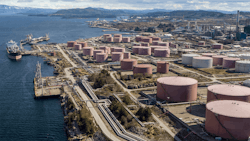Equinor proposes conversion of Mongstad refinery into low-carbon hub
Equinor ASA has let a contract to Aker Solutions ASA to execute a feasibility study for the proposed transformation of subsidiary Equinor Refining AS’ 226,000-b/d refinery at Mongstad, on Norway’s western coast, into a low-carbon industrial cluster equipped for production of blue hydrogen and sustainable aviation fuel (SAF).
Aimed at identifying opportunities for reducing carbon dioxide (CO2) emissions from the existing refinery in line with Equinor’s broader energy transition plan, the feasibility study will investigate options for both newly proposed and existing installations at the site, including integration of brownfield, greenfield, and third-party technologies, Aker Solutions said on Feb. 14.
The current scope of the study for the refinery’s planned conversion—formally known as the Mongstad industrial transformation project (MITP)—specifically entails developing pathways for developing:
- A grassroots plant that produces blue hydrogen from natural and refinery fuel gas.
- Carbon capture and export.
- A new plant able to produce SAF from municipal solid waste at an emissions-reduction rate of more than 70%.
While Aker Solutions confirmed its work on the MITP is ongoing, the service provider did not reveal a timeframe for when it will deliver Equinor a completed feasibility study for the project.
The proposed MITP follows Equinor’s 2022 completion of a project to replace the Mongstad refinery’s combined heat and power plant with a new heater that has since resulted in an estimated net-emissions reduction of 250,000 tonnes/year (tpy) (OGJ Online, July 5, 2022).
In its fourth-quarter 2023 earnings report to investors, Equinor said it remains on track to achieve its 2030 goal of reducing overall CO2 emissions from its operations by more than 50% on its journey to achieving net-zero emissions by 2050.
Reduced emissions amid growth of its renewables, decarbonized energy, and carbon capture and sequestration (CCS) businesses also underpin the company’s ambition to reduce net-carbon intensity by 20% by 2030 and 40% by 2035, Equinor said.
MITP details
In a project description on its website, Equinor said the proposed MITP is a measure to reduce risks posed to the refinery—Norway’s only—stemming from increased costs of high-CO2 emissions at the site.
Ongoing studies for the MITP have already evaluated several different ways to reduce CO2 emissions, including customized production according to future market requirements, as well as unidentified opportunities for CCS, according to the operator.
Equinor confirmed one option under consideration is conversion of the refinery's fuel gas to low-carbon, blue hydrogen and CO2, where hydrogen would replace fuel gas for powering refining operations and CO2 would be transported for storage in Smeaheia in the North Sea (OGJ Online, Apr. 5, 2022).
The clean hydrogen specifically would be used to produce SAF at the site, the operator said.
Equinor has yet to disclose an official timeline for the MITP, nor has it revealed details regarding the future of crude oil processing at the Mongstad.
About the Author
Robert Brelsford
Downstream Editor
Robert Brelsford joined Oil & Gas Journal in October 2013 as downstream technology editor after 8 years as a crude oil price and news reporter on spot crude transactions at the US Gulf Coast, West Coast, Canadian, and Latin American markets. He holds a BA (2000) in English from Rice University and an MS (2003) in education and social policy from Northwestern University.

